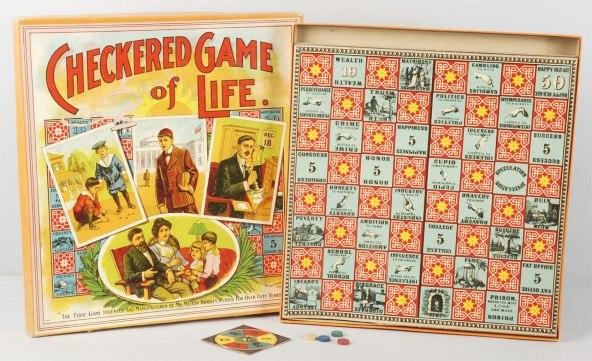
Throughout the month of August, we’re looking at Ecclesiastes, that strange and seemingly “modern” Old Testament book that depicts what happens when humanity searches for ultimate meaning apart from God.
In 1856 a young businessman named Milton Bradley hatched a plan to make his fortune.
He produced an immensely popular picture of a rising politician – a clean-shaven lawyer from Illinois named Abraham Lincoln.
In 1860 Lincoln was elected president. Good news! But then he grew a beard. Overnight, Bradley’s inventory became worthless.
One of Bradley’s friends, hoping to cheer him up, brought over a crude board game. The 24-year-old entrepreneur suddenly had an idea: He would invent his own game, something highly moral that would help players grow in character and live better lives.
He called it The Checkered Game of Life.
As Jill Lepore writes in her book Mansions of Happiness: A History of Life and Death, Bradley’s game presented to children the realities of virtue and vice. Decisions are required. Truth exists, and you can either ignore it or choose to seek it out.
You might land on a square called Honesty and go directly to Happiness. But you might also land on Poverty and feel miserable. You definitely didn’t want to land on Disgrace. Nor was it a good thing to land on the square by which you entered politics.
Bradley designed the game so that becoming a politician made one far more likely to commit crimes and end up in prison.
One hundred years later, the creative team at the Milton Bradley Company decided to re-invent their founder’s original board game to celebrate its centennial. In 1960 they introduced The Game of Life. Millions of Baby Boomers grew up moving little station wagons around the board, and herding blue and pink plastic “kids.”
Lepore points out that this new game was shamelessly cash conscious. It was not about serving others, and it was definitely not about finding the best path to heaven. The team at Milton Bradley felt sure that no modern child really wanted to figure out how to become more virtuous.
“You count your cash, not your good deeds,” she observes. In The Game of Life, you never die. You just quit working.
Then, shortly before Wall Street imploded in 2008, Hasbro (which had subsumed Milton Bradly) introduced yet another version: The Game of Life Twists and Turns.
In this version, life is aimless. Instead of following a pre-determined path, each player decides how to spend their own time. Hang out? Travel? Have kids? Whatever.
Instead of pretend cash, you get a pretend VISA brand credit card. “We’re helping to educate kids. It’s never too early,” explained the folks at Hasbro. You can plunge into massive debt but still continue playing. There was a square for this in Milton Bradley’s original game. It was called the Road to Folly.
What’s the point of Twists and Turns? Players don’t grow in virtue. They collect experiences. Lepore reflects: There are “a thousand ways to live your life… No one dies, no one grows old, no one ever grows up… How does life begin? What does it mean? What happens at the end? Who knows? You choose.”
Welcome to the 21st century.
The author of Ecclesiastes never shies away from acknowledging life’s twists and turns. This, after all, is the same guy who launched his book by looking around and declaring, “Everything is meaningless!”
But that doesn’t mean there isn’t a real path. And a finish line that is worth reaching. Along the way, we must strenuously avoid the aforementioned Road to Folly. He writes:
“Guard your steps when you go to the house of God. Go near to listen rather than to offer the sacrifice of fools, who do not know that they do wrong. Do not be quick with your mouth, do not be hasty in your heart to utter anything before God… A dream comes when there are many cares, and many words mark the speech of a fool. When you make a vow to God, do not delay to fulfill it. He has no pleasure in fools; fulfill your vow” (Ecclesiastes 5:1-5, selections).
At first glance this looks may seem like a muddled stew of spiritual counsel. But it springs from the Old Testament understanding that “fools” are men and women who barrel through life’s intersections of wisdom and common sense, and are quite certain they’re on the high road to happiness.
Fools dismiss the advice of others (Proverbs 15:5) and trust their own brilliance (Proverbs 18:2).
According to the Bible, fools aren’t dumb. They aren’t lacking in formal education or IQ. A fool is foolish because he or she thinks their own moral compass is an infallible guide to the Good Life. Unless they come to their senses, fools are going to be gravely disappointed – in this world and the next.
“Much dreaming and many words are meaningless,” says the author of Ecclesiastes. “Therefore fear God” (5:7).
In the real game of life, the stakes are high.
Truth exists, and you can either ignore it or choose to seek it out.
And every new morning, once again, it’s your turn.
